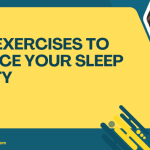Table of Contents
- Introduction
- 1. The Science of Caffeine and Sleep
- 2. Caffeine’s Half-Life: Timing Matters
- 3. Anxiety and Caffeine: The Quickening Effect
- 4. Sleep Architecture Disruption
- 5. Long-Term Impact on Brain Health
- Conclusion
- FAQs
Introduction
Caffeine is the world’s most widely consumed psychoactive substance. From that first sip of coffee in the morning to the energy drink you grab during an afternoon slump, caffeine plays a significant role in our daily lives. However, while it can boost alertness and productivity, it can also disrupt sleep and affect brain health. Let’s explore five critical ways caffeine can impact your sleep quality and mental well-being.
1. The Science of Caffeine and Sleep
Caffeine works primarily by blocking the action of adenosine, a neurotransmitter responsible for promoting sleep and relaxing the brain. When adenosine is inhibited, we feel more awake and alert. However, this interference can make it challenging to fall asleep and stay asleep. According to a study published in the Journal of Clinical Sleep Medicine, caffeine consumption even six hours before bedtime can significantly reduce sleep quality.
“Caffeine can disrupt sleep even when consumed hours before bedtime.”
Visual Element: Adenosine vs. Caffeine
| Neurotransmitter | Effect on Sleep |
|---|---|
| Adenosine | Promotes sleep and relaxation |
| Caffeine | Blocks adenosine, leading to wakefulness |
If you’re curious about the intricacies of neurotransmitters and their effects on sleep, you can read more from the National Sleep Foundation.
2. Caffeine’s Half-Life: Timing Matters
Caffeine has a half-life of approximately 5 to 6 hours, meaning that if you consume 200 mg of caffeine, about 100 mg will still be in your system after 5 to 6 hours. This lingering presence can hinder your body’s ability to wind down, especially if you’re drinking coffee or tea later in the day.
A practical approach is to limit caffeine intake to the morning and early afternoon. For example, if you plan to go to bed at 10 p.m., it’s best to avoid caffeine after 3 p.m.
“Timing your caffeine intake can significantly influence your sleep quality.”
Tip: Keep a caffeine journal to track your intake and how it correlates with your sleep patterns.
3. Anxiety and Caffeine: The Quickening Effect
For many, caffeine can cause heightened anxiety levels. It stimulates the nervous system, increasing heart rate and blood pressure, which can lead to feelings of restlessness. When combined with stressors from daily life, this heightened state can make it difficult to relax and prepare for a good night’s sleep.
A study published in Psychosomatic Medicine highlights that individuals prone to anxiety may be more sensitive to caffeine’s effects. If you find yourself feeling jittery or anxious after consuming caffeine, it may be wise to consider reducing your intake.
“Caffeine can amplify feelings of anxiety, particularly in sensitive individuals.”
Did You Know? The Anxiety and Depression Association of America reports that high caffeine consumption can lead to exacerbated anxiety disorders.
4. Sleep Architecture Disruption
Our sleep is composed of several stages, including light sleep, deep sleep, and REM sleep. Caffeine can alter this sleep architecture. Research indicates that caffeine consumption can reduce the percentage of deep sleep, which is crucial for physical recovery and mental clarity.
If you’re getting less deep sleep, you may wake up feeling groggy and unrefreshed, even after a long night in bed.
Visual Element: Sleep Stages Chart
| Sleep Stage | Duration (Approx.) | Importance |
|---|---|---|
| Light Sleep | 50% | Easy to wake up |
| Deep Sleep | 20-25% | Physical recovery |
| REM Sleep | 20-25% | Memory consolidation |
“Disruption in sleep architecture can lead to grogginess and reduced mental clarity.”
For an in-depth understanding of sleep stages, check out the Sleep Research Society.
5. Long-Term Impact on Brain Health
While moderate caffeine consumption can be safe for most adults, excessive intake may pose risks for long-term brain health. Studies indicate that high caffeine consumption could be linked to increased anxiety, depression, and even cognitive decline in older adults.
According to a review in the American Journal of Clinical Nutrition, habitual caffeine consumption may also be associated with neurodegenerative diseases like Alzheimer’s.
“Excessive caffeine intake may have detrimental effects on long-term brain health.”
Tip: If you’re concerned about long-term health impacts, consider discussing caffeine consumption with your healthcare provider.
Conclusion
Caffeine can be both a friend and a foe. While it provides a much-needed boost during the day, it’s essential to be mindful of how it affects your sleep and overall brain health. By understanding the science behind caffeine, its timing, and its effects on anxiety and sleep architecture, you can make informed choices that lead to better sleep and improved cognitive function.
FAQs
1. How much caffeine is too much?
Most studies suggest that up to 400 mg of caffeine (about four 8-ounce cups of brewed coffee) per day is generally safe for most adults. However, individual tolerance can vary.
2. Can I build a tolerance to caffeine?
Yes, regular consumption can lead to tolerance, meaning you may need to consume more to achieve the same effects over time.
3. What are some caffeine alternatives?
Herbal teas, decaffeinated coffee, and caffeine-free energy drinks can provide a similar experience without the jitters or sleep disruption.
4. Is it okay to consume caffeine before a workout?
In moderation, caffeine can enhance performance by increasing alertness and reducing perceived effort. However, timing is key—avoid consuming it too close to bedtime.
For more insights on how to maintain a healthy brain and improve your overall wellness, consider exploring related topics on neuro care, including how lifestyle changes can enhance your brain health or the importance of regular check-ups for neurological health.






